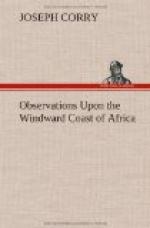CHAPTER XI.
Conclusion
Appendix.
No. I.
Letter to the Right Honourable Lord Viscount Howick, His Majesty’s late principal Secretary of State for Foreign Affairs, on the Eve of his Lordship introducing the late Bill into Parliament for the Abolition of the Slave Trade; shewing at one View the most simple and ready Mode of gradually and effectually abolishing the Slave Trade, and eradicating Slavery
No. II.
Letter to the Right Honourable the Lords Commissioners of the Admiralty, referred to in the foregoing Letter to Lord Howick
No. III.
Of the Purrah
Of the Termite, Termes, or Bug a Bug, as it is called by the Natives upon the Windward Coast of Africa
Of the Camelion
On the Interment of the Dead
On the Amusements, Musical Instruments, &c. of the Africans
Concluding Observations
Vocabulary of the Languages of the principal Nations of the Windward Coast of Africa
Directions to the Binder.
Mandingo Chief and his Head Man, with other Natives in their Costume, to face the Title Page.
Sketch of the Windward Coast of Africa to face page 1
Palma
The Colony of Sierra Leone and Islands of Banana
Island of Goree
Porto Praya, Island of St. Jago
Island of Fogo, Cape Verd
Island of St. Jago, and Paps of Cape Verd
Bance Island, River Sierra Leone
In illustration of the above Plates, it may be satisfactory to the Reader to explain that the Turban, in the Frontispiece, distinguishes the Mandingo Chief; and that the Cap, which adorns the Head Man, is embroidered by themselves on scarlet cloth procured from Europeans in trade, and is executed with great ingenuity.
The narrow stripe of blue cloth suspended behind from the covering which adorns one of the figures in the back ground, distinguishes a female in the state of virginity.
This distinguishing mark of virgin purity is uniformly removed upon entering into the matrimonial state, and is called by the Timmauees Tintanjey.
In the Plate of Bance Island, River Sierra Leone, page 33, is a correct representation of the Pullam tree, described in page 38, as bearing a species of silk cotton, or ether down, and is much revered by the natives, who consider it in many instances as their Fetish.
* * * * *
ERRATA.
Page 54, line 8, for gallunas
read galhinas.
62 2, for is derived from the African
gris-gris, read,
is the expression from which
the African gris-gris is
derived.
64 20, for lugras, read lugars.
92 6, for bungra, read bangra.




